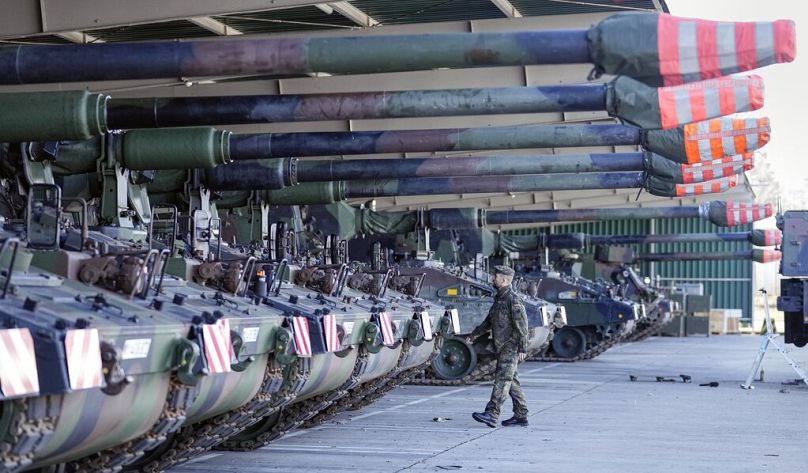Time is ticking for the defence sector. A net-zero target by 2050 is no easy task, and with a worsening climate crisis, the industry has a mountain to climb, Karem Akoul writes.
The defence sector is a vital pillar in society, providing stability, safety, and reassurance.
The need for reliable and robust defence resources remains as pertinent as ever, with demand unlikely to slow anytime soon.
With this in mind, the defence sector must make efforts to minimise detrimental environmental impact while future-proofing processes against climate disasters.
Looking toward more sustainable methods of operation, the defence sector has an opportunity to invest in improved and more reliable systems of supply while negating further damage to the environment.
How does climate change affect the military?
Climate change presents a number of challenges to the sector. A study published by the European Defence Agency (EDA) and the European Commission’s Joint Research Centre (JRC) has confirmed the dangers that climate change poses to the future of defence industries, calling for a shift towards more sustainable processes.
It revealed the need for national strategies to protect against weather-related natural disasters, which are becoming increasingly common.
These climate hazards, including flooding, storms and extreme temperatures, present a notable threat to the operation of the defence sector.
Defence assets, capabilities, logistical operations and civilian entities employed in the operation of critical energy infrastructure (CEI) are all at risk of compromise if the climate risk remains unchallenged.
Such disruptions will have increasingly impactful consequences on military activity, reducing its efficiency and capacity for effective operation.
With such uncertainty ahead, it’s essential that the defence sector looks to adopt more sustainable processes to combat shortages in stock and delays in the supply chain while enhancing energy security and autonomy.
The sector contributes to the climate emergency, too
Meanwhile, the industry must also play its part in reducing the effects of climate change as a preventative measure.
While it’s necessary to prepare contingency plans for the worsening symptoms of global warming, action must be taken now.
The defence sector is a significant consumer of fossil fuels and raw materials, contributing to a major carbon footprint.
For example, defence accounts for 50% of UK government emissions and 80% of US government emissions.
With the European Green Deal aiming for the European Union to reach climate neutrality and resource efficiency by 2050, the defence sector has a lot of work to do in reversing its contribution to climate change.
What can be done to change the tune?
From military-industrial emissions of greenhouse gases to management and disposal of hazardous waste, the nature of defence necessitates the production and use of environmentally-detrimental materials.
With this in mind, the industry’s footprint must be offset wherever possible.
With much of the future success of the defence sector hinging on energy resilience in the face of catastrophic weather events, it’s vital providers achieve energy autonomy, allowing operations to continue where they would otherwise be grounded.
However, the JRC-EDA report notes the defence sector’s lack of capacity and capability in being able to act on any significant change where tackling climate change is concerned, recognising a need for a systematic approach to achieving sustainability.
Therefore, the report recommends the incorporation of sustainable measures across multiple facets of the industry, namely operational aspects, capability planning and development, governance, multi-stakeholder engagement, and research, development and innovation.
Small positive steps count as well
Beyond the JRC-EDA report, there are numerous ways in which the industry could mitigate the effects and adapt to climate change.
Small positive changes could include incorporating electric fleet vehicles, to installing renewable energy technologies on defence sites, such as solar panels or wind turbines.
Reducing reliance on fossil fuels would mark a significant step in the right direction, and with defence being a significant draw on energy resources, alternative energy sources would both ease the strain on energy crises and reduce carbon emissions from fossil fuel-generated electricity.
At a worker level, industry employees should be provided with education and opportunity for dialogue regarding decarbonisation, diversification and just transition, ensuring efforts to curb the sector’s emissions are aligned across the industry.
A study conducted by the University of Glasgow found that workers were not being consulted by their unions or company leaders, despite expressing interest in developing strategies for achieving sustainability in defence.
Meanwhile, the defence sector has a responsibility to communicate its green strategies to the outside world.
The industry is continually scrutinised, and therefore transparency in its sustainability efforts is key. Any doubts could easily be put at ease by proper and clear communication to lay out plans for tangible change.
Prove the doubters wrong
More environmentally-friendly decisions could also be made at an inventory level, choosing to invest in recycled and recyclable equipment.
With an additional £16.5 billion being allocated to the UK defence budget from 2020/21 to 2024/25, it’s vital that this increased expenditure is as sustainable as possible, making ethical choices to reduce waste and manage stock responsibly.
Time is ticking for the defence sector. A net-zero target by 2050 is no easy task, and with a worsening climate crisis, the industry has a mountain to climb.
But, by systematically actioning report-led recommendations, the defence sector has an opportunity to prove its doubters wrong — "going green" while improving the effectiveness of operations.
Karem Akoul is a Project Manager at CP Cases, a custom military equipment manufacturer.
At Euronews, we believe all views matter. Contact us at view@euronews.com to send pitches or submissions and be part of the conversation.
















